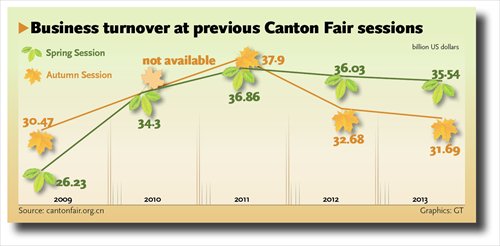HOME >> BUSINESS
No rise in deals expected at Canton Fair
By Zhang Ye Source:Global Times Published: 2014-4-14 23:43:02

A woman makes stuffed toys that will be exported to US and European markets in Ganyu, East China's Jiangsu Province. Photo: CFP

The number of buyers at the spring session of the China Import and Export Fair, which is set to open Tuesday, is unlikely to surpass the figure for the same session last year, said the fair's spokesperson, citing uncertainties in external markets.
The biannual event, also known as the Canton Fair, takes place every spring and fall in Guangzhou, capital of South China's Guangdong Province.
The fair is seen as an indicator for China's export and import performance, said Liu Jianjun, deputy director of the China Foreign Trade Center and spokesperson for the Canton Fair, during a pre-fair press conference held in Guangzhou on Monday.
However, Liu said the number of buyers was likely to be similar to last year's spring session, which attracted 202,766 visitors.
"The world economy is starting to recover, but the future is still uncertain. And the international competition is getting fiercer," said Liu.
China's advantage in foreign trade has weakened, and its products have become less popular than those made in Southeast Asian countries due to surging domestic labor costs, said Bai Ming, a research fellow at the Chinese Academy of International Trade and Economic Cooperation.
The country also has a long way to go before it can develop new trade advantages, which will restrict business turnover at the Canton Fair, Bai told the Global Times Monday.
According to data from the General Administration of Customs, the total value of China's imports and exports reached 5.9 trillion yuan ($948.7 billion) during the first quarter, down 3.7 percent year-on-year. And the total value of exports fell by 6.1 percent year-on-year to 3 trillion yuan.
The annual business turnover or value of the deals signed at the Canton Fair has been declining since 2011. Last year, the figure was $67.2 billion, down 2.15 percent from 2012.
Wang Changyin, general manager of the overseas trading unit of Guangdong-based home appliance retailer Galanz Group, does not expect the event to help increase orders as much as it did several years ago.
"The function of the Canton Fair seems to have changed in recent years. It is now more like a platform to display enterprises' new products or enhance overseas brand recognition. Less and less foreign participants are willing to sign deals on the spot," Wang told the Global Times Monday.
Instead, more companies are turning to e-commerce platforms to find trade partners, according to Wang.
It is more cost-efficient for companies, especially small and medium-sized enterprises, to use business-to-business (B2B) websites, "because they can avoid transportation and other costs by just using the Internet to find buyers," Bai noted.
According to Beijing-based market research firm iResearch, Chinese companies signed deals worth 3.1 trillion yuan with foreign partners on B2B websites in 2013, compared to 2 trillion yuan in 2012.
This year's spring session has attracted 24,581 exhibitors from China and abroad, 165 less than the same session last year.
Given the boom in e-commerce, even fewer exhibitors will be interested in attending mass trade fairs in the future, Zhou Bin, a professor at the Shanghai University of International Business and Economics, told the Global Times Monday.
But e-commerce will not have a significant impact on the traditional means of face-to-face trading in the short term, Bai said.
Posted in: Economy